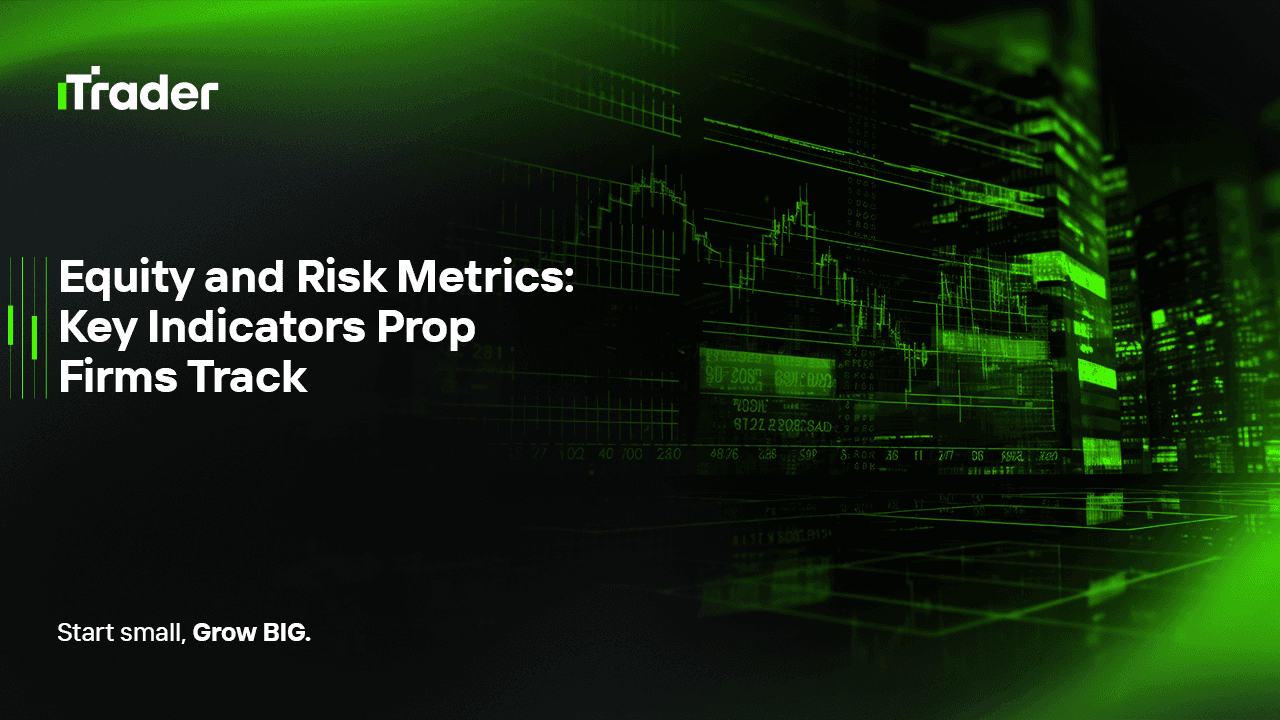2025-09-18
Every trader dreams of landing a funded account with a prop firm. The appeal is obvious: you get access to significant trading capital without risking your own money beyond the evaluation fee. But while most aspiring traders focus on how much profit they can make, prop firms are focused on something far more important: how you manage risk and equity over time.
Prop firms don’t just want traders who can hit a big profit target once. They want traders who can survive the long game. To them, it’s not about whether you can make 10% in a month — it’s about whether you can manage equity drawdowns, respect daily loss limits, and trade consistently without gambling. That’s why equity and risk metrics are at the very heart of every prop firm evaluation.

In this blog, we’ll explore the exact equity and risk metrics prop firms care about most. You’ll learn why these numbers matter, how they’re calculated, and how you can align your trading strategy with them to improve your chances of passing evaluations and keeping a funded account.
Let’s start with the basics.
Balance: This is the cash in your account excluding any open trades. If you closed all your trades right now, your balance is what you’d have.
Equity: This is your balance plus or minus any floating profit or loss from open positions.
Formula:
Equity = Balance + FloatingPnL
Example:
Equity = $10,000 + (300 – 100) = $10,200
Why prop firms care:
If your balance is $10,000 but your equity temporarily drops to $9,000 because of floating drawdown, a prop firm will count that $1,000 drop against your daily or maximum drawdown limits. In other words, equity is the true measure of risk, and it’s what firms monitor most closely.
Making money in the markets is only half the story. Without proper risk management, profits are temporary, and losses can wipe out accounts overnight. Prop firms know this, which is why their evaluations are designed to filter for traders who respect risk limits.
Risk metrics tell the firm:
These metrics don’t just matter for the evaluation stage — they’re also used once you’re funded. If you breach risk limits in a live account, your funding will be revoked, regardless of how profitable you were before.
Let’s go through the most common and important ones.
Example:
Starting balance: $100,000
Max DD limit: -$10,000
If your equity drops to $90,000 at any point, you fail the challenge.
Example:
Account: $100,000
Daily DD limit: -$5,000
If your equity drops below $95,000 on any given day — even for a second — the account is violated.
Prop firms know that one lucky trade doesn’t prove skill. That’s why they enforce rules around consistency:
Example rule: “No single trade can account for more than 30% of total profits.”
This ensures traders don’t bet big once and pray for a lucky outcome.
Example:
Passing a prop challenge isn’t just about hitting the profit target. It’s about respecting every single risk metric along the way.
Scenarios:
This is why traders who only focus on the profit target often fail challenges. Successful prop traders understand that risk metrics are the real test.
It’s worth noting that risk metrics aren’t just numbers — they’re psychological filters. Prop firms know:
By enforcing these rules, firms protect their capital and ensure only resilient, consistent traders move forward.
Equity and risk metrics form the backbone of prop firm evaluations. While many traders obsess over profit targets, the reality is that drawdowns, daily loss limits, consistency, and risk management matter far more. Prop firms aren’t searching for one-time winners — they’re searching for traders who can manage equity responsibly and perform sustainably in the long run.
If you want to succeed in prop trading, shift your mindset:
That’s the true path to not just passing evaluations, but keeping your funding and growing as a professional trader.
© 2025 iTrader Global Limited|公司註冊編號:15962
iTrader Global Limited 註冊於科摩羅聯盟昂儒昂自治島穆扎穆杜 Hamchako,並受科摩羅證券委員會授權與監管。我們的牌照編號為 L15962/ITGL。
iTrader Global Limited 以「iTrader」為商業名稱經營,獲得從事外匯交易活動之授權。公司標誌、商標與網站均為 iTrader Global Limited 之專有財產。
iTrader Global Limited 的其他子公司包括:iTrader Global Pty Ltd,澳洲公司註冊編號(ACN):686 857 198。該公司是 Opheleo Holdings Pty Ltd 的授權代表(澳洲金融服務代表編號:001315037),Opheleo 持有澳洲金融服務執照(AFSL 編號:000224485),註冊地址為:Level 1, 256 Rundle St, Adelaide, SA 5000。
免責聲明:本實體並非本網站所交易金融產品之發行者,亦不對其負責。
風險提示: 差價合約(CFD)交易因槓桿效應具高度資本迅速損失風險,未必適合所有使用者。
參與基金、差價合約及其他高槓桿商品交易,需具備專業知識。
研究顯示,84.01% 的槓桿交易者最終蒙受損失。請務必充分了解相關風險,並在投入資金前確保自身已準備好承擔全部損失的可能性。
iTrader 特此聲明,對任何個人或法人因槓桿交易所導致之風險、損失或其他損害,概不承擔全部責任。
使用限制: iTrader 並不向法律、法規或政策禁止此類活動的國家或地區居民提供網站或服務。如您居住於限制使用本網站或服務之司法管轄區,您有責任自行確保遵守當地法律。